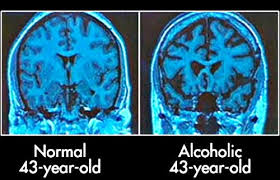Lesson 1: Clinical Disorders – Part F
PART F
What Happens if Someone Keeps Using Drugs?
 Think about how you feel when something good happens—maybe your team wins a game, you’re praised for something you’ve done well, or you drink a cold lemonade on a hot day—that’s your limbic system at work. Because natural pleasures in our lives are necessary for survival, the limbic system creates an appetite that drives you to seek those things.
Think about how you feel when something good happens—maybe your team wins a game, you’re praised for something you’ve done well, or you drink a cold lemonade on a hot day—that’s your limbic system at work. Because natural pleasures in our lives are necessary for survival, the limbic system creates an appetite that drives you to seek those things.
The first time someone uses a drug of abuse, he or she experiences unnaturally intense feelings of pleasure. The limbic system is flooded with dopamine. Of course, drugs have other effects, too; a first-time smoker may also cough and feel nauseous from toxic chemicals in a tobacco or marijuana cigarette. But the brain starts changing right away as a result of the unnatural flood of neurotransmitters. Because they sense more than enough dopamine, for example, neurons begin to reduce the number of dopamine receptors. Neurons may also make less dopamine. The result is less dopamine in the brain: this is called down regulation. Because some drugs are toxic, some neurons may also die.
Long -Term Effeccts
Drug use can eventually lead to dramatic changes in neurons and brain circuits. These changes can still be present even after the person has stopped taking drugs. Below you can see the changes in the size of the brain of an alcoholic.

The following example regarding gambling, a non-substance based addiction, is reprinted with permission from the Illinois Institute for Addiction Recovery.